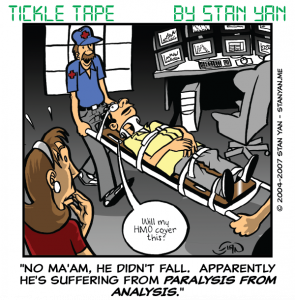Have you been making plans for the coming year? Have you been trying to make sense of where you’ve been so far? It’s useful to ask and answer a few key questions: Where have I been? Where am I going? Where am I going to go next? The answers to these questions aren’t always obvious. But consider the plight of Sam and Jim, two novice traders with very different personalities and life circumstances who have been asking these questions. Maybe their answers will help you answer the question, What’s next?
Sam is a novice trader in his mid-thirties. He is a computer programmer in Silicon Valley. Since he lives on the West Coast, he has a few good hours every morning to trade before leaving for work. Although he has a day job, he’s committed to trading. He spends every night learning about new strategies and scanning charts. Sam is smart, dedicated, and has the requisite time to hone his trading skills, but in studying his past performance records, he’s identified some issues that he can’t easily reconcile.
He has trouble sticking with his trading plan. He often feels overly stressed out. The markets are uncertain and he has trouble accepting this fact of trading life. He has trouble sleeping at night and he can’t seem to relax while making a trade. Sam has always been the kind of person who likes to play it safe. He doesn’t like taking chances. In looking at Sam’s life, we see a person who is a little anxious and uneasy with the lack of structure that is typical of most trading days. At first glance, one might think that he doesn’t have the temperament to trade as a short-term trader.
Things don’t seem to be going very well, so what should Sam do next? First, he could work around his personality. On the one hand, he is overly emotional and has difficulty feeling at ease. But on the other hand, he is a disciplined person who can show self-control when necessary. It is possible for him to develop stress management skills. He could examine his self-talk and identify the ways he subconsciously tells himself to worry and get upset.
He could then develop thinking strategies to counteract this problem. For example, he can limit his risk and trade smaller so that there is little chance that he’ll lose a big chunk of his capital should his trades go sour. He could think of the big picture and remind himself that any single trade is merely one of a series of trades and that if he makes enough trades, he will come out ahead. It could work, but it really depends on how well Sam can change his personal psychology.
His past life experiences have moulded his current personality to some extent, so he’s going to have to work hard to change it. Unless he can change his personality, he may never achieve his objective of mastering the markets as a short-term trader. Even if he can’t change his personality, he doesn’t have to give up trading altogether. He can just change his style of trading. Some people who are nervous prefer becoming long-term investors, which allows them time to see how their trading plan pans out. But whatever he decides, he must closely examine his past, his current performance, and either change his personality or change his style of trading.
Compare Sam’s plight to Jim’s. Jim works as a real estate agent in New Mexico. He is successful as an agent, and he only spends about 20 hours a week showing properties or closing deals. The rest of the time he devotes to trading. Jim isn’t easily stressed out. As a salesman, he knows that you have to live by the motto, “try and try again” to make it. He carries over his enthusiasm for trading, making trade after trade. He finds the uncertainty of the markets exciting, and he can’t wait for the markets to open.
He’s not doing much better than Sam, however. He doesn’t stick to his trading plan and often overtrades. But there’s a big difference. He is calm when he trades. He is used to taking risks and finds trading thrilling and energizing. Sure, he will have to learn to develop more self-control and discipline, but with practice and exposure to the markets, Jim is likely to master the markets. Whatever he decides to do next, he won’t have to make too many changes to his personality. He just needs to learn more about how to trade and he needs to combine knowledge with experience to master the markets.
In thinking of what you want to do next in this business, it’s essential to take a good hard look where you have been and where you can go. A realistic plan will make you a winner. But that’s only half of it. You also need training, practice, and experience. When you combine all these factors into a long-term strategy for success, you’ll become one of the few traders who have mastered the markets.


